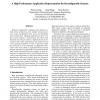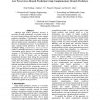328 search results - page 24 / 66 » Static performance prediction of skeletal parallel programs |
ICDCS
1991
IEEE
14 years 51 min ago
1991
IEEE
of ‘‘network computers’’ is inherently lessAbstract predictable than that of more traditional distributed memory systems, such as hypercubes [22], since both theFor computa...
MICRO
2000
IEEE
14 years 26 days ago
2000
IEEE
Value prediction breaks data dependencies in a program thereby creating instruction level parallelism that can increase program performance. Hardware based value prediction techni...
ERSA
2004
13 years 10 months ago
2004
Modern reconfigurable computing systems feature powerful hybrid architectures with multiple microprocessor cores, large reconfigurable logic arrays and distributed memory hierarch...
IPPS
2009
IEEE
14 years 3 months ago
2009
IEEE
Abstract—Recent years have seen a trend in using graphic processing units (GPU) as accelerators for general-purpose computing. The inexpensive, single-chip, massively parallel ar...
IPPS
2008
IEEE
14 years 2 months ago
2008
IEEE
Although high branch prediction accuracy is necessary for high performance, it typically comes at the cost of larger predictor tables and/or more complex prediction algorithms. Un...



